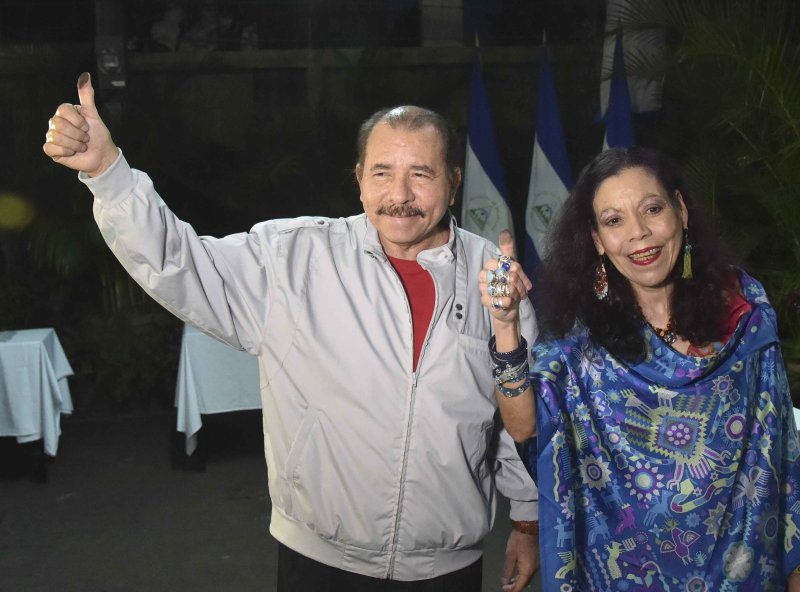1 of 2 | Nicaraguan President Daniel Ortega and his wife Rosario Murillo pose for a photo after voting in the general elections at a polling station in Managua, Nicaragua in 2016. The U.S. Treasury Department said Monday it would freeze the assets of six officials in Nicaragua over the “fraudulent” inauguration of President Ortega. File Photo by Rodrigo Arangua/EPA
Jan. 10 (UPI) -- The United States and the European Union sanctioned several Nicaraguan government officials on Monday as the country's President Daniel Ortega was inaugurated to a fourth term.
The coordinated sanctions come as the State Department also announced it would impose visa restrictions against 116 people "complicit in undermining democracy in Nicaragua, including mayors, prosecutors, university administrators, as well as police, prison and military officials."
The U.S. Treasury Department's Office of Foreign Assets Control said in a statement that its sanctions target the U.S. assets of six top government officials of the Ortega regime as well as the Nicaraguan Institute of Telecommunications and Mail, or TELCOR, an agency that regulates and monitors communication services in the country.
The EU said in a statement it blacklisted seven Nicaraguans including family members of Ortega and his wife, Vice President Rosario Murillo, as well as the three entities of the National Police of Nicaragua, the Supreme Electoral Council and TELCOR.
President Ortega and Vice President Murillo were inaugurated to a fourth term Monday after widely condemned national elections in November during which seven of Ortega's challengers were arrested and two others went into exile.
"The Ortega-Murillo regime continues its subjugation of democracy through effectuating sham elections, silencing peaceful opposition, and holding hundreds of people as political prisoners," said Brian Nelson, undersecretary for terrorism and financial intelligence.
Those who will have their assets frozen by the United States include Bayardo DeJesus Pulido Ortiz and Bayardo Ramon Rodriguez Ruiz, both generals in the Nicaraguan Army, and Defense Minister Rosa Adelina Barahona De Rivas for "state acts of violence" against political opponents.
The Treasury Department said that actions from the Ortega-Murillo regime have led to more than 300 deaths, 2,000 injuries, and the imprisonment of hundreds of citizens since 2018 -- leading more than 100,000 Nicaraguans to flee the country.
"The Nicaraguan Army not only refused to order the disarming and dismantling of paramilitary or "parapolice" forces during and after the political uprisings but the military also provided weapons to the parapolice who carried out acts of violence against Nicaraguans," the Treasury Department said.
The Treasury Department noted that the regime operated a "troll farm" of more than 1,000 social media accounts that Facebook had identified and removed, which were tied to TELCOR employees and tried to discredit pro-democracy protesters.
"We removed a network of 896 Facebook accounts, 132 Pages, 24 Groups and 362 Instagram accounts in Nicaragua," Facebook said at the time. "This operation targeted domestic audiences in that country and was linked to the government of Nicaragua and the Sandinista National Liberation Front (FSLN) party."
The Treasury Department also said that during the election, TELCOR suspended the license for television Channel 21 after former presidential candidate Reverend Guillermo Osorno, a director at the station, publicly denounced anomalies in the electoral process.
The TELCOR executives sanctioned are Nahima Janett DiazFlores, director-general of TELCOR, and Celina Delgado Castellon, the agency deputy director-general.
Ramon Humberto Calderon Vindell, a retired major general and president of the board of directors of the Nicaraguan Mining Company, has also been sanctioned, according to the Treasury Department.
Secretary of State Antony Blinken said in a statement about the visa restrictions that the Nicaragua regime "continues to hold 170 political prisoners, with many of those detained suffering from a lack of adequate food and proper medical care."
"Ortega's corrupt security and judicial system arrested these individuals for practicing independent journalism, working for civil society organizations, seeking to compete in elections, and publicly expressing an opinion contrary to government orthodoxy, among other activities considered normal in a free society," Blinken said.
"President Ortega will inaugurate himself for a new presidential term today, but the pre-determined election he staged on November 7 does not provide him with a new democratic mandate; only free and fair elections can do that. The Nicaraguan people deserve nothing less."
The United States, EU and other Western allies have repeatedly enforced coordinated sanctions or imposed them individually against Nicaragua for human rights violations and ongoing abuses against its people.
In total, the EU has blacklisted 21 individuals and three entities with the last time being in early August.
The United States last did so with Canada and Britain following November's election.















